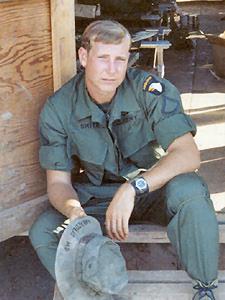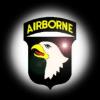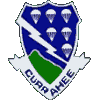| |
|
|
|
Russell Francis Smith
Specialist Four
D CO, 2ND BN, 506TH INFANTRY, 101ST ABN DIV, USARV Army of the United States Crownsville, Maryland October 18, 1948 to October 22, 1969 RUSSELL F SMITH is on the Wall at Panel W17, Line 107 See the full profile or name rubbing for Russell Smith |
  |

|



| |
|
Smitty, it's been a long time since you and I were together. I just got the courage to do this for you. I try to remember all the good times we had and forget all the bad but it sure is hard. We kept each other going, didn't we, buddy? I just wanted to say thanks. You will always be remembered by us. Goodbye, old friend.
John McIntire |
|
I was the Company Commander of D Company when Russ Smith was killed. He was always one of the good guys in our company - who would always pitch in and do more than his share of anything that needed to be done. Carrying supplies, digging fighting positions, whatever needed doing; Smitty was there with a smile on his face to help out. We were operating along the Demilitarized Zone (DMZ) between North and South Vietnam; the 3rd Brigade of the 101st had been moved into the area, to cover the withdrawal of the 1st Marine Division. There weren't many Viet Cong (VC) (Guerrilla fighters born in South Viet Nam) in our area - probably because there wasn't any civilian populace either. But there were plenty of North Vietnamese Army (NVA) soldiers, since we were only a few kilometers south the DMZ. And although those NVA normally avoided contact with the US Military - every one in the company was tense, because you could just never tell where the NVA would pop up. The NVA favored "stand-off" attacks, using heavy machine guns or mortars. This region was very mountainous, heavily forested and the NVA learned through hard experience that it was best hit hard from the next ridge line (400 - 600 meters away) and then run down the other side of the ridge line to protect themselves from our return fire. Hit and run. That morning Delta Company had just moved to a helicopter landing zone (HLZ) to receive our normal resupply. Habitually a rifle company received a resupply every fourth or fifth day in the field. There weren't many HLZs in those mountains, and everyone knew the bad guys often targeted them, because the NVA realized that sooner or later US helicopters would be using the few HLZs that were cut on the heavily wooded ridge lines. So often the NVA would assign a small group to set up to watch and wait for US activity on the HLZ, and attack when the helicopter arrived. As a result rifle companies tried not to hang around HLZs, we would move into the area just an hour before scheduled resupply, clear the local area and neighboring ridge lines, and wait for the helicopter. After the resupply helicopter dropped-in, we quickly "hot-footed" it out of the area. That morning as our resupply helicopter was on short final to the HLZ we suddenly heard the ominous sound of a NVA mortar; thump, thump, thump, it was one 82mm mortar, but the bad guys had stocked up on ammunition. Mortars are fired by dropping the rounds down the muzzle, and so there is about two seconds between the rounds. And the mortar thumps continued, and continued, they had about 25 rounds in total. The time of flight of a mortar shell is between 30 and 90 seconds - the suspense of where the shell will land during those seconds is suffocating. The NVA preferred tactic was to wait until the US helicopter had landed, hoping that the helicopter would make enough noise to cover the sounds of their mortar firing. And if their timing worked just right, their first mortar rounds would be landing before the helicopter has lifted out of the HLZ. Their mortar shells would kill soldiers, but even more importantly might also damage or destroy the Yankee helicopter. But this group of NVA started dropping rounds in their mortar just about 10 seconds too early to achieve their objective. Our resupply helicopter was only seconds from landing when we heard the NVA mortar, but the ground guide waved off the helicopter and dove for cover. Luckily for us, there were open fighting positions around this HLZ, from some previous fire fight, and everyone burrowed into those holes. Boom, boom, boom, the 82 mortar round packs a punch, and they were landing all around the HLZ, it seemed like they would never stop falling. Fortune shined on us and the Battalion Command and Control (C&C) Helicopter was also overhead, controlling a Heliborne Air Assault about five kilometers away, when they heard our resupply bird report that he had been waved off - they looked down just in time to see our HLZ position exploding with mortar shells, but also were able to spot the NVA mortar team who were still dropping rounds down their 82 mm mortar. That doesn't happen often, but the C&C helicopter had two Cobra attack helicopters supporting the Air Assault and was able to immediately direct them against the NVA mortar team. That was the last combat action for that NVA mortar team. The NVA had never seen Cobra helicopters before the arrival of the 101st Airborne Division, and quickly came to fear the "skinny helicopters" After the mortar rounds stopped falling, people started crawling out of their holes, and checking themselves for wounds. Quite a few of the NVA mortar shells had exploded in the tree tops, creating "air bursts" which are quite deadly. But somehow it seemed we didn't have any serious injuries. We quickly prepared to move, but then word come up from one of the platoons that they just found two of their soldiers had been killed. One of the NVA mortar rounds penetrated the tree tops and had landed on the very edge of their fox hole and had killed both soldiers instantly. Russell Smith and Vince Saldano were gone. Their platoon and the entire company were dumb struck. Russ Smith was a first-class soldier, and an exceptional young man. We miss him. And expect that when we meet Smitty next, he will still be smiling, and pitching in to help anyone who needs it.
From his company commander, |
A Note from The Virtual WallDelta Company, 2/506th Infantry, lost two men on 22 Oct 1969: SGT Vincent Saldano of Oakland, California, and SP4 Russell F. Smith. |
| Contact Us | © Copyright 1997-2019 www.VirtualWall.org, Ltd ®(TM) | Last update 08/15/2019. |